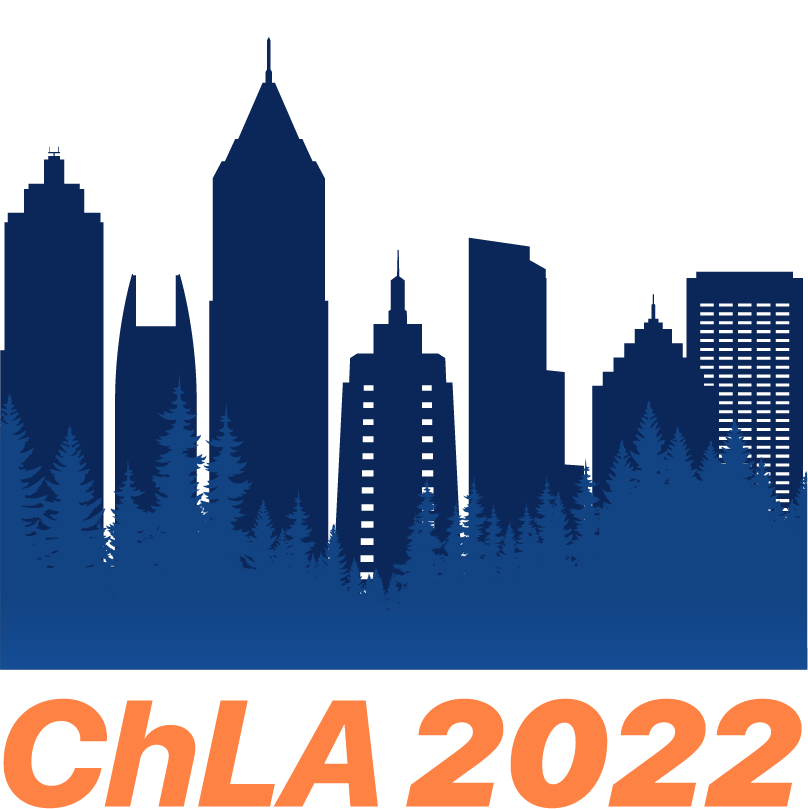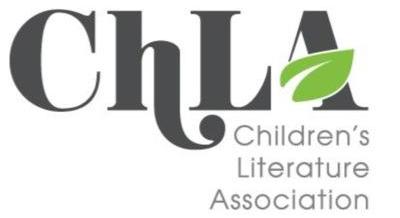- About ChLA
- Committees
- Accessibility Committee
- Anne Devereaux Jordan Committee
- Article Award Committee
- Astrid Lindgren Award Committee
- Book Award Committee
- Communications Committee
- Conference Advisory Committee
- Diversity Committee
- Edited Book Award Committee
- Ethics Committee
- Finance and Development Committee
- Grants Committee
- Global Committee
- Judith Plotz Emerging Scholar Award Committee
- Membership Committee
- Ombuds Committee
- Phoenix Award Committee
- Phoenix Picture Book Award Committee
- Members
- Events
- Awards & Grants
- Publications
- Opportunities & Resources
ChLA 2022 Annual Conference: June 2 - 4, 2022 Theme: City in a ForestHyatt Regency Atlanta
265 Peachtree Street, NE Atlanta, GA 30303 CONFERENCE REGISTRATIONSPONSORSHIP OPPORTUNITIESHotel Rates & Reservations DetailsACCESSIBILITY GUIDELINESPRELIMINARY AGENDATWO VERY SPECIAL EVENTS
|
| Full Conference Rates | Early Bird Registration (thru May 7, 2022) |
Regular Registration (May 8 - 20, 2022) |
Late Registration (May 21 - June 3, 2022) |
|
Member |
$365 |
$390 |
$415 |
|
Member: Student / Contingent Faculty / Unemployed |
$235 |
$235 |
$235 |
|
Non-Member |
$420 |
$445 |
$470 |
|
Non-Member: Student / Contingent Faculty / Unemployed |
$235 |
$235 |
$235 |
| Daily Rates | Early Bird Registration (thru May 7, 2022) |
Regular Registration (May 8 - 20, 2022) |
Late Registration (May 21 - June 3, 2022) |
|
Member |
$230 |
$255 |
$280 |
|
Member: Student / Contingent Faculty / Unemployed |
$180 |
$180 |
$180 |
|
Non-Member |
$265 |
$290 |
$315 |
|
Non-Member: Student / Contingent Faculty / Unemployed |
$180 |
$180 |
$180 |
Cancellation Policy:
All cancellation requests must be made by email at [email protected]. All conference cancellations are subject to a $25 administrative fee.
Before May 1: Full refund less $25 administrative fee.
May 1 - May 20: 1/2 refund less $25 administrative fee.
After May 20: No refunds will be given
ChLA 2022 - City In A Forest
“We pass under the shade of the magnolias and red oaks that sprout everywhere in Atlanta. Trees easily outnumber residents.”
The Downstairs Girl (2019) by Stacey Lee
Atlanta holds any number of monikers—Hollywood of the South or the Cradle of the Civil Rights Movement, for example. Indeed, local residents also refer to Georgia’s state capital as the “City in the Forest.” And so, for ChLA 2022: Atlanta, the first in-person meeting of the Children’s Literature Association since 2019, we’d like to grapple with the questions, contradictions, and possibilities that arise in considering the concept of a “City in a Forest” within the context of young people’s literature and media.
Children’s literature scholars have long grappled with the ways in which young people have been associated with the natural world, whether that be to nostalgize an idyllic, pastoral past or to emphasize youth’s wild, untamed behavior. But children are also used in culture as markers of the future, which is often conflated with progress, industry, and metropolitan spaces. As Rebekah Sheldon notes, “The child became legible not only as a record of the past but as the recipient of a specific biological inheritance freighted with consequences for the future.” The figure of the child, in other words, becomes a site of promise, possibility, and protection.
Critics have explored the implications of an ideological nexus between city and nature on many fronts, from perspectives of environmentalism to that of hybridity. As we ponder relationships between the city and the forest within and beyond children’s literature, we can also look to and learn much from Afrofuturism, Indigneous futurisms, and other frameworks that explore the ecosystems of individual and social identity.
We see this in Melissa Jenkins’s study of the flying motif in Black picture books. Jenkins identifies how characters make sense of the divides between country and city, past and future in the ways that they “map, mark, and delineate as part of pointed socioeconomic critiques, responding to the difficulties of urban life by expanding the accepted geographies of black experience and politicizing projects of urban ‘uplift.’”
Patrizia Zanella similarly draws attention to flight in The Marrow Thieves by Cherie Dimaline (Georgian Bay Métis Community, Métis Nation of Ontario). Zanella reads the efforts of the young Indigenous protagonists of Dimaline’s novel’s “to relearn their language while being on the run” as an example of Leanne Betasamosake Simpson (Michi Saagiig Nishnaabeg)’s assertion that “Indigenous fugitivity is always flight inwards” and “away from settler colonialism.” As Dimaline’s characters travel through trees and surrounding dystopian urban spaces, they create and renew kinship relationships, including, climatically, in a type of Indigenous city in the forest where they join up with like-minded resisters.
Such narratives exist within and around Atlanta, a city marked by contradiction, trauma, and prosperity. It wrestles with how to negotiate its past with its present, and continues to experiment with future paths that will both support a diverse metropolitan area and embrace its natural environs. For instance, Clarkston, a suburb of Atlanta, has the highest number of refugees per capita in the United States, and many local refugee organizations focus their efforts on creating community spaces that take advantage of Atlanta’s “forest”—community gardens, co-ops, and summer camps for children. But stories of the refugee experience also take into account the hardships of landscape, such as Linda Sue Park’s Long Walk to Water or Fabio Geda’s In the Sea there are Crocodiles.
We invite you to join us as we examine, from any number of angles or interpretative lenses, this concept of a “City in a Forest” within children’s and young adult literature, media, and culture.
